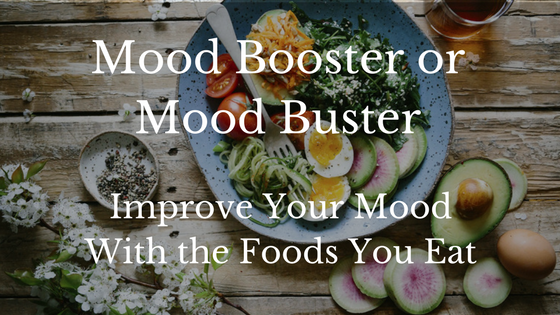Boosting your mood is something we know we can do by inhaling certain scents, being surrounded by different colors and listening to music; but did you know that you could boost your mood with food?
Just like the scents of essential oils, food interacts with our bodies at the chemical level. This interaction creates either a “good” mood or a “bad” mood.
Have you found yourself in a bad mood an hour or so after eating and wondered why?
The sad part, you probably never connected your mood to the food you ate.
I know I’ve stopped myself on occasion and wondered why in the world am I in such a mood. It didn’t make any sense to me at the time.
There’s no question that what you eat can affect how you feel.
I’ve learned that our bodies interact with the foods we eat in many different ways, which has the potential to impact our moods.
Let’s talk about mood-boosting and mood-busting foods.
Mood-boosting foods
Nutrients
Here’s a thought: could some mental health problems actually be caused by some nutrient deficiencies?
Research believes that there is a connection; this includes deficiencies in B-vitamins, vitamin D, and the mineral selenium.
So, getting enough vitamins, minerals, (and other things like antioxidants) are key. These nutrients not only reduce inflammation but also fuel the biochemical reactions in our bodies. Including those that create neurotransmitters; which enhance our moods.
So, make sure you’re eating a variety of nutrient-dense whole foods, especially fresh fruits and vegetables. In fact, studies show that people who eat the most fruits and vegetables are the happiest.
Also pay special attention to vitamin D (the sunshine vitamin), as it’s not naturally occurring in too many foods. Selenium is an essential mineral found in Brazil nuts, walnuts, cod, and poultry. Try to add some of those to your weekly diet.
Protein
Second, make sure you get enough protein.
Protein is your body’s main supply of amino acids. Amino acids are very important for mood issues because they are the building blocks of neurotransmitters. Protein also helps to regulate blood sugar.
I recommend eating protein with every meal; this includes dark green leafy vegetables, eggs, poultry, and meat.
Carbohydrates
Third, complex carbohydrates like sweet potato and quinoa are great too. They allow better absorption of key amino acids like tryptophan. Tryptophan is used by your body to make serotonin (your “happy hormone”) and melatonin (your “sleepy” hormone). So, if you want to relax, try these in the evening.
Fatty Acids
Fourth, fish and other sources of omega-3 fatty acids (nuts, seeds, and algae) are also mood-boosting. Omega-3s are definitely “brain food” and may help to ease some symptoms.
FUN FACT: One study showed that giving one multi-vitamin and one omega-3 fish oil tablet per day to prison inmates reduced the incidence of violent behavior by 50%!
Last but not least, make sure you’re hydrated. Mild dehydration can cause mood issues as well.
Mood-busting foods
You won’t be surprised to hear me say processed foods are mood-busters, right?
One study suggests that eating a lot of processed foods devoid of nutrients can increase your chances of becoming depressed by as much as 60 percent! This is on top of the research that shows nutrient deficiencies can look like mental health problems.
“But it makes me feel good!”
Yes, some of these mood busters can make you feel better temporarily. Some big food companies study how to maximize the “pleasure” centers with the perfect amount of sugar, salt, and fat. Not to mention the color, texture, and taste; they can light up our taste buds and make us feel good… for now.
A few other things to avoid are:
- Alcohol (nervous system depressant)
- Caffeine (may worsen anxious feelings and ability to sleep)
- Sugar (messes with your blood sugar and can worsen inflammation).
Bad moods can lead to bad eating habits; and, bad eating habits can lead to bad moods. If you need a mood boost, stick to minimally processed nutrient-dense whole foods. Things like fresh fruit and vegetables (including leafy greens), nuts and seeds, eggs, fish, poultry, and meat. Avoid common mood-busting foods like alcohol, caffeine, and sugar.
And remember, sometimes “feel good” junk foods, only make you feel good temporarily.
Here’s a sweet “mood booster” recipe for fruit salad. I enjoy mixing up a variety of seasonal fruits and having this as my daily serving of fruit. Get creative and let me know your favorite blend of fruits.
Join us in our member Facebook group Healthy Living for Life and enjoy your healthy living journey with others. Have you wondered how eating a vegan diet can lower your stress? Here’s a great article from Lisa Williams on how Veganism can lower your stress?
Mood Boosting Fruit Salad
Ingredients
- 1 - 2 Cups Strawberries, fresh
- 1 - 2 Cups Cantaloupe, cubed
- 1 - 2 Cups Blueberries, fresh
- 1 - 2 Cups Blackberries, fresh
- 1 - 2 Cups Green Seedless Grapes
Instructions
- Place all fruit in a large bowl and gently toss.Serve and enjoyTip: Substitute or add any fresh seasonal fruit, like strawberries, peaches, kiwi, etc.
References:
http://www.precisionnutrition.com/food-and-mood
http://www.precisionnutrition.com/how-to-fight-depression-naturally-with-nutrition
https://nutritionfacts.org/video/foods-increase-happiness/




